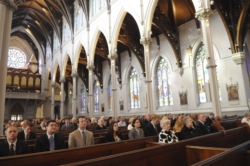Lawyers’ Guild gathers for annual Red Mass
A medieval tradition was invoked Sunday, Sept. 20 when about 200 Catholic lawyers, jurists and others involved in the legal profession gathered for a Mass at the Cathedral of the Holy Cross followed by a dinner at the Seaport Hotel for the annual Red Mass and banquet. The event was hosted by the Catholic Lawyers’ Guild.
The tradition of the Red Mass began in France in 1245 at the Cathedral of Paris and made its way to England during the 14th century. On each Sept. 29, judges and lawyers attended a Mass to inaugurate and invoke the guidance of the Holy Spirit for the new legal year. Offered as a Mass of the Holy Spirit, celebrants wore red vestments.
The tradition continued in Boston this past weekend as North Region Bishop Francis X. Irwin was the principal celebrant of a Mass attended by many members of the Catholic Lawyers’ Guild. Concelebrating were Father Mark O’Connell, judicial vicar of the Archdiocese of Boston and chaplain of the Guild, and other staff members of the Metropolitan Tribunal and other canonical offices.
In his homily, Bishop Irwin spoke of the legacy of his brother, John, former Chief Justice of the Massachusetts Superior Court and Chief Justice for Administration and Management of the Trial Court of Massachusetts who died in December 2008 at the age of 78.
“We always looked to him to set the tone for our family,” the bishop told the congregation. “It is because of John. I am convinced that’s why I’m here today, to thank this group for their response to John’s death.”
Bishop Irwin closed his homily by remarking on the role of a lawyer in ministering to young people today, who are bombarded with harsh cultural messages from a wide array of media sources that leave them disoriented and disengaged.
“We need people such as the Catholic Lawyers’ Guild who will allow them to see in us what the word of God means,” Bishop Irwin said. “We need people who are able to bring to the world a sense of who we are, what we are, and why we are.”
“We have taken away from them their God, and that they are unique and God loves them and calls them by name. We have exchanged it by saying this is freedom,” the bishop said.
He continued by reminding those gathered that, instead, we must remind young people that God is unique and that He has a plan for each of us.
“We need the youth, who will be our future, to understand who they are and where they are going,” Bishop Irwin said.
The bishop’s words resonated with those present.
“I thought it was appropriate because a lot of these people are dealing with young people’s lives in one way or another. Either they are in trouble or they are helping in some other way,” said Paul Shanley, who practices family law pro bono. “We need to be advocates for these young people and show them the way.”
“I think what he’s telling us is someone has to draw the line somewhere,” added Jim Morris, a partner in the Boston firm of Quinn and Morris.
John Garvey, dean of Boston College Law School, was the keynote speaker at the annual dinner following the Mass. In his remarks, Garvey spoke of how the practice of law and the life of faith can be integrated.
“Religious teaching is not a piece of evidence,” Garvey said. “It is a way of looking at the world. I can in no way set it aside.”
To illustrate his point, Garvey used the debates surrounding abortion and capital punishment. He pointed out that both pro-life and pro-abortion rights arguments about when life begins and ends are based on religious grounds.
“There is no neutral or detached point of view,” he said.
He remarked that opponents of capital punishment base their arguments on the Gospel, and key Catholic documents such as the 1995 encyclical “Evangelium Vitae” and a 1980 statement published by the United States Conference of Catholic Bishops.
While the First Amendment says that there will be no official state religion, it does not govern attorney-client relationships. Therefore, the personal practice of faith has a place in the professional practice of law as attorneys need to practice the virtues of compassion and forgiveness, he said.
“The law is not war,” Garvey said. “The people on the other side of the circuit or transactions are not our enemy. They are our brothers and sisters in Christ.”
“We need to do what we can to heal the relationship that their wrong has disrupted,” Garvey continued. “Our aim is only victory, not destruction.”



















